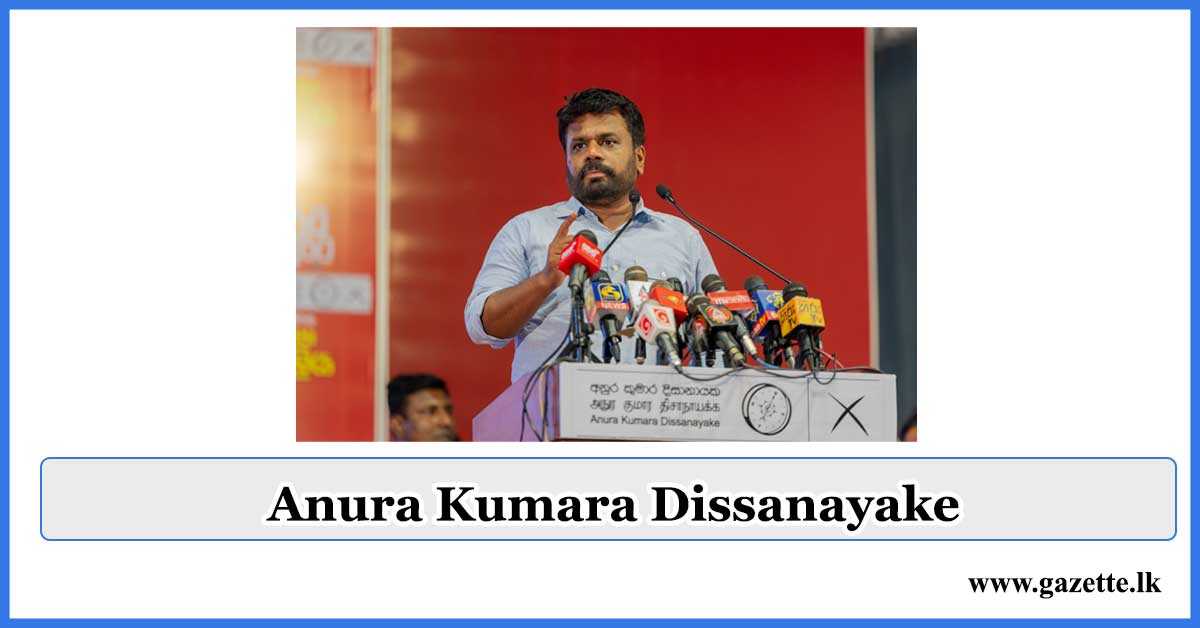Anura Kumara Disanayaka has become an iconic figure in Sri Lankan politics, promoting social justice, progressive reforms, and a different kind of Sri Lanka. As the head of the Janatha Vimukthi Peramuna (JVP), Disanayaka has set himself apart from other political leaders by prioritizing a people-centered strategy and a vehement fight against corruption. His political career demonstrates a strong dedication to transforming Sri Lanka’s future by implementing policies that prioritize social justice, economic equality, and environmental sustainability.
Political Development and Important Turns
Anura Kumara Disanayaka’s political career has been closely linked to the Janatha Vimukthi Peramuna (JVP), a Sri Lankan Marxist political organization. JVP was initially established as a revolutionary movement, but under Disanayaka’s direction it experienced substantial transformations and became a mainstream political organization. He has played a key role in guiding the party away from the violent strategies of its founding and toward a more democratic and peaceful stance.
Disanayaka has participated in many important events during his political career. His ascent to the party’s leadership position inside JVP signaled a sea change for the organization, as he implemented modifications meant to bring its political tactics up to date and make it more appealing to the younger demographic. His political career has been defined by his audacious opposition to human rights abuses, neoliberal economic practices, and corruption.
Ideology and Vision
Disanayaka’s views on socialism, equality, and justice serve as the foundation for his plans for Sri Lanka. His political philosophy, which is firmly based in socialist ideas, promotes equitable access to resources, income redistribution, and the advancement of marginalized communities. In his ideal Sri Lanka, every person, regardless of social or economic status, will have the chance to prosper.
Defending a robust welfare state, combating corruption, and advancing environmental sustainability are among his fundamental beliefs. Disanayaka is a champion of the common man because he has consistently opposed policies that benefit the privileged at the expense of the working class. His ideas are intended to establish a more democratic society in which the people hold the government responsible.
Part in the Peramuna Janatha Vimukthi
Anura Kumara Disanayaka, the JVP’s leader, has been instrumental in determining the party’s course. Under his guidance, there has been a noticeable turn toward democratic values and nonviolent political activism. He oversaw the JVP’s rise to prominence in Sri Lankan politics and its ability to compete with the established parties.
Collaboration and reaching consensus are key components of Disanayaka’s leadership style. He has made an effort to bring the party together and broaden its appeal beyond its core supporters. His ability to relate to young people has been especially noteworthy, as he has been able to successfully engage a new voter base that is fed up with the status system.
Participation in National Concerns
Disanayaka has made a name for himself in politics by tackling important national concerns. He has made a strong case for economic reforms that put the needs of the general public ahead of those of corporations. His position on corruption is unwavering; he has demanded increased accountability and transparency in governmental organizations.
Additionally, Disanayaka has actively supported social justice and human rights. He has continuously campaigned to advance laws that safeguard society’s most defenseless citizens and spoken out against violations of human rights. He has established a reputation as a leader who actually cares about the welfare of the populace thanks to his contributions to national discussions on healthcare, education, and poverty reduction.
Campaign for President
The presidential campaign of Anura Kumara Disanayaka is a daring challenge to Sri Lanka’s established political system. His platform, which stands in sharp contrast to that of his opponents, has been justice, equality, and reform. Disanayaka has made a name for himself as a leader who isn’t hesitant to take on established political figures and offer creative answers to the nation’s most serious issues.
His pledge to eradicate corruption is one of his campaign’s main points. Disanayaka has underlined time and time again the necessity of structural change in order to end the corruption cycle that has afflicted Sri Lankan politics for many years. Many voters have responded favorably to his emphasis on empowering the people and building a government that represents the interests of the majority.
Obstacles Met Throughout the Campaign
Disanayaka’s presidential campaign has encountered several obstacles, despite his popularity with some sections of society. Political rivals have been criticizing him because they think his socialist policies are too extreme. In addition, Sri Lanka is facing significant social and economic difficulties that have bred doubt and uncertainty in the country’s atmosphere.
In addition, Disanayaka has had to deal with the well-established political systems that support the two main political parties. His campaign’s success will be heavily dependent on his ability to overcome the dominance of these parties. He hasn’t wavered from his promise of reform and transformation, though, emphasizing long-term fixes over immediate electoral advantages.
Financial Strategies
Disanayaka’s economic agenda is founded on building an equitable and sustainable economy. He is a champion for laws that give regular Sri Lankans’ needs top priority, especially when it comes to jobs, healthcare, and education. His economic plan calls for substantial changes that will lessen wealth disparity and guarantee that the advantages of economic expansion are shared fairly by all members of society.
His philosophy of sustainable development is based on the idea that social welfare and the environment shouldn’t be sacrificed for economic progress. In order to build economic resilience and safeguard the environment, Disanayaka has laid out plans to invest in green technologies and advance sustainable agriculture.
Foreign policy and international relations
In terms of foreign policy, Disanayaka wants to strengthen ties with the world’s allies of Sri Lanka while upholding the country’s sovereignty and taking an independent stand. In place of relying on a single superpower, he promotes a balanced approach to international affairs that emphasizes respect for one another and cooperation.
Developing regional alliances, especially with South Asian neighbors, is another item on his foreign policy agenda. According to Disanayaka, Sri Lanka ought to engage in more active regional diplomacy and endeavor to promote stability and peace in the area.
The impact on society and culture
Anura Kumara Disanayaka’s political agenda addresses social and cultural issues in addition to political and economic improvements. He has been a steadfast supporter of healthcare and education reforms, two areas vital to Sri Lankan society’s well-being. Many voters have responded favorably to his emphasis on expanding access to high-quality healthcare and education.
Disanayaka is also dedicated to safeguarding the rich cultural legacy of Sri Lanka. In order to realize his vision of a successful and cohesive Sri Lanka, he believes that it is imperative to promote national identity and cultural pride. His reputation as a leader with strong ties to Sri Lanka’s cultural heritage has been further cemented by his support for cultural initiatives and his commitment to preserving the nation’s many customs.
Environmental Guidelines
The dedication of Disanayaka to environmental preservation is a central tenet of his political agenda. He has been an outspoken supporter of laws intended to slow down global warming and advance sustainable development. Disanayaka thinks Sri Lanka needs to move quickly to solve its environmental problems, especially with regard to pollution, deforestation, and resource depletion.
His environmental policies are centered on fostering sustainable agricultural practices, decreasing the nation’s dependency on fossil fuels, and promoting renewable energy. In addition, Disanayaka has demanded more measures to safeguard Sri Lanka’s biodiversity, acknowledging that the nation’s natural resources are critical to its long-term social and economic prosperity.
Criticisms and Controversies
Anura Kumara Disanayaka has had her fair share of controversy and criticism, just like any other political figure. His Marxist initiatives, according to some of his detractors, are excessively radical and might have unforeseen effects on the nation’s economy. Others have questioned his capacity to carry out his bold plan in the face of fierce resistance from the political establishment.
Disanayaka, however, has directly responded to these critiques by reiterating his dedication to responsible and practical governance. He has maintained that in order to actually affect change in Sri Lanka, his initiatives are not only doable but also essential. His followers see him as a leader who is sincere in his commitment to the welfare of the populace and who is not afraid to confront the status quo.
Public opinion and popularity
Anura Kumara Disanayaka is regarded differently by the public; while some see him as a visionary leader, others find him to be divisive. But there’s no doubting his rising popularity, especially with younger people who want change. According to opinion polls, Disanayaka has a sizable following, especially in cities where his message of reform is well-received.
His growing popularity is attributed to his ability to engage people in both speeches and campaigns. Disanayaka has gained the respect and admiration of many people because of his emphasis on resolving the issues facing common people rather than serving the interests of the elite.
Upcoming prospects
With the 2024 presidential election drawing near, Anura Kumara Disanayaka appears to have bright future possibilities. He is predicted to lead Sri Lanka into a new phase of social justice and political transformation if elected. His administration may bring about a dramatic change in the country’s political climate by emphasizing the development of a more just and sustainable future for all Sri Lankans.
Despite the difficulties that lie ahead, Disanayaka is a strong contender because of his tenacity and vision for the nation. His success as president would largely depend on his capacity to handle the complexity of Sri Lankan politics and carry out his bold plan.
In summary
The political career and presidential candidacy of Anura Kumara Disanayaka offer Sri Lankans a singular chance for transformation. He differs from other traditional political leaders in that he is dedicated to social fairness, economic change, and environmental sustainability. With all of Sri Lanka’s upcoming challenges, Disanayaka’s vision gives hope for a more egalitarian and brighter future.
Personal Information
| Born | Dissanayaka Mudiyanselage Anura Kumara Dissanayake 24 November 1968 (age 56) Galewela – Matale District |
| Family | His father was an office worker and his mother was a housewife. He had one sister
Spouse – Mallika Dissanayake |
| Political party | Janatha Vimukthi Peramuna (JVP) |
| Other political | National People’s Power (NPP) |
| Occupation | Politician |
| Graduate | University of Kelaniya |
| Website | https://www.parliament.lk/members-of-parliament/directory-of-members/viewMember/112 |
| https://web.facebook.com/anurakumara/?_rdc=1&_rdr | |
| https://www.instagram.com/anurakumaraofficial/?hl=en | |
| X (Formerly Twitter) | https://x.com/anuradisanayake |


